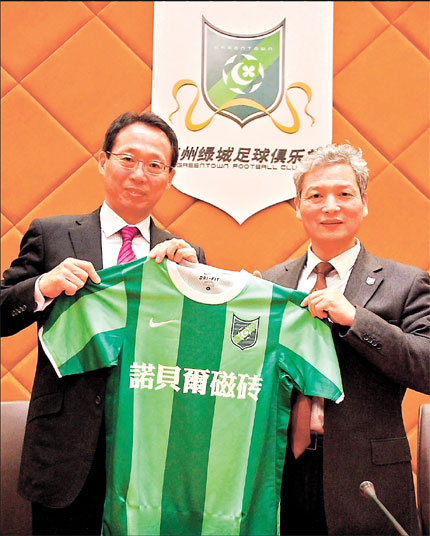Big spending does little for grassroots
 0 Comment(s)
0 Comment(s) Print
Print E-mail
Shanghai Daily, December 16, 2011
E-mail
Shanghai Daily, December 16, 2011
 |
|
Takeshi Okada (left) who took Japan to the knockout stages of last year's FIFA World Cup will manage CSL side Hangzhou Greentown. |
The rise of the Chinese Super League as a lucrative destination for high-profile footballers has done little to stifle concern about the underachieving national team or the grassroots development of the game in the world's most populous country.
Shanghai Shenhua's signing of Nicolas Anelka from Premier League giant Chelsea made headlines around the world this week when it emerged the ex-France international will join the Chinese club with a wage exceeding US$300,000 a week.
Shenhua doesn't plan to stop its recruiting drive there, either, with reports circulating about a push to sign Anelka's Chelsea teammate Didier Drogba.
While Asian Football Confederation director of competitions Tokuaki Suzuki is happy to see the big names introduced to the 2012 Asian Champions League, the continent's flagship club competition, he hopes that equal attention can be given to grassroots development in China.
It's only a month since China was bundled out of qualifying for the 2014 World Cup.
"We welcome such players to come to Asia to play for domestic leagues, as well as the AFC Champions League which can provide the platform where players showcase their capabilities," Suzuki said. "We expect that such moves will become more common in Asia. In the short term, it will definitely help promote the game in China, but in the meantime we think that it will be very important to keep investing in grassroots level to ensure the sustainable growth of Chinese football as well as considering the financial balance in the long term."
For the moment, however, China's long-suffering fans are enjoying some excitement after years of watching the national team struggle and its clubs lose to those of Japan and South Korea in Asia.
Big spending
AFC acting president Zhang Jilong has welcomed the big spending by clubs in his native China. "It is always good to see world-class players signing up for Asian clubs," Zhang said. "Football fans around the world will pay more attention to Asian soccer because of these big signings."
Zhang expects the arrival of big names from Europe will aid the development of the game in Asia, adding that the recent recruiting "also proves that the gap between Asian football and the best of world football is closing fast."
"Asia has been an attractive destination now for international football players for some time and this confirms it."
Guangzhou Evergrande spent more than US$10 million in the summer to sign Argentine star Dario Conca from Brazilian side Fluminense. Conca then helped the team to its first title by a margin of 15 points.
Coach Lee Jang-soo said he isn't finished spending, and the club has set a target of reaching the quarterfinals at next year's Asian Champions League.
"We hope we can add two or three high quality players to the roster before the start of next season," Lee said. "We want to defend our title and perform well in the Asian Champions League next season."
Despite the money being spent at the top level, there are reportedly fewer than 10,000 registered junior players in China compared with more than 300,000 in Japan.
"One million yuan (around US$160,000) would help fulfill the soccer dreams of 50 boys a year, but it is really a huge number for us," Chen Ze, a youth coach, said.
The country's Deputy Sports Minister Cai Zhenhua blamed the national team's failures on systematic problems.
"We were far behind the international level in many aspects including the soccer population, the training regimen and the professional league," he said.
Go to Forum >>0 Comment(s)
 Add your comments...
Add your comments...
- User Name Required
- Your Comment
- Racist, abusive and off-topic comments may be removed by the moderator.





